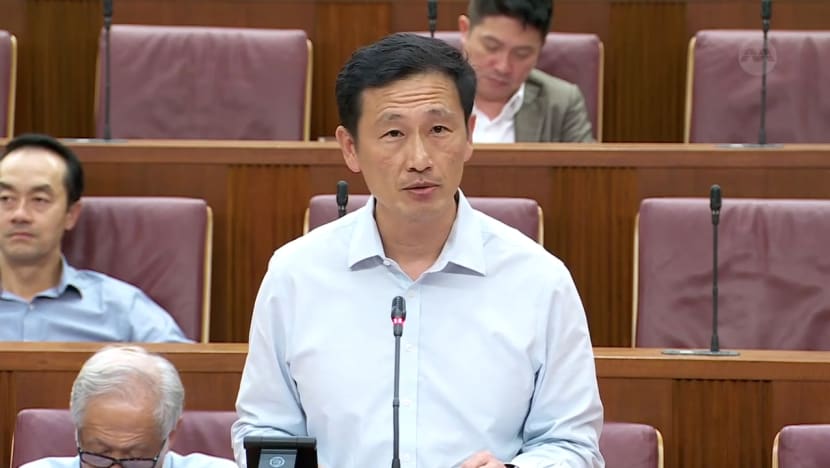Singapore must ensure healthcare fiscal burden does not spiral out of control: Ong Ye Kung
Singapore has delivered good outcomes given its spending of 4 per cent of GDP on healthcare, says the Health Minister.

Health Minister Ong Ye Kung speaks in parliament on May 10, 2023.
SINGAPORE: Singapore needs to make sure healthcare spending as a proportion of GDP does not increase too much, Health Minister Ong Ye Kung said.
“In the coming years, our challenge is not to spend more, but to ensure we do not go the way of many OECD countries, with the healthcare fiscal burden spiralling and escalating out of control,” he said on Wednesday (May 10) in parliament.
It is also “widely known” that spending more on healthcare does not necessarily lead to better health outcomes, he added.
Mr Ong said the US and UK spend 17 per cent and 10 per cent of their gross domestic products on healthcare respectively. That compares with 4 per cent in Singapore.
But the US and UK still face a high incidence of chronic illness, high obesity rates and lower expected lifespans.
“We have delivered good health outcomes given what we are spending,” he said.
The minister was responding to points brought up by Non-Constituency MP Leong Mun Wai (PSP) during a two-day debate on a motion on supporting healthcare, which was tabled by Nominated MPs Dr Tan Yia Swam, Mr Abdul Samad and Dr Shahira Abdullah.
GOVERNMENT SPENDING ON HEALTHCARE
In his speech, Mr Leong said the government has not contributed enough to cover healthcare expenditure. He cited World Health Organization statistics on Singapore’s government covering 43 per cent of healthcare costs in 2019, compared with 33 per cent in 2011.
He said the figure is still much lower than the average of 75 per cent for Organisation for Economic Cooperation and Development (OECD) countries.
“Singaporeans are experiencing first-world healthcare costs but receiving much less first-world financial support from the government,” Mr Leong said on Tuesday.
He called on the government to help Singaporeans cope with rising healthcare costs to reduce social inequality.
“While a wealthier family can handle a medical catastrophe better, a similar catastrophe can easily wipe out the MediSave and cash savings of a low-income family even after MediShield payout,” he said.
In response, the Health Minister said Singapore has been able to keep healthcare affordable for middle- to lower-income groups.
He said around seven in 10 Singaporeans in subsidised wards do not pay any out-of-pocket expenses, eight in 10 pay less than S$100 (US$75) and nine in 10 pay less than S$500.
“When Mr Leong asked (the) government to spend more to lower out-of-pocket expenses further, he really meant to channel resources to unsubsidised patients, that is, those staying in A-class wards or private hospitals.
“This is where the big bucks and big expenditure are and it will push our healthcare expenditure and spending to the levels of OECD countries,” Mr Ong said.
He also said the NCMP failed to mention that government expenditure ultimately has to be raised from the people through taxes. “Mr Leong had not made any mention of where PSP will get funding from.”
HEALTHCARE SPENDING FOR AN AGEING SOCIETY
As it stands, the Health Ministry has the second-largest budget after the Defence Ministry, Mr Ong said. Nominal government health expenditure tripled in the decade after 2010 and is expected to triple again in the following decade.
“This is driven by an ageing population, who is also getting sicker.”
Additionally, the minister said Mr Leong’s understanding of the Pioneer Generation and Merdeka Generation funds was misplaced.
The size of the funds was determined based on the projected lifetime cost of benefits, taking inflation and interest accrued into account.
Members of the Pioneer and Merdeka Generation “still have quite a bit of runway ahead of them”, Mr Ong said, adding that many are expected to live until 90 or 100 years old and their lifetime benefits need to be paid out by the two funds.
Mr Leong earlier said the funds should increase payouts to members, noting that only a small percentage of the total assets are paid out each year.
The Health Minister said the government will continue to review the adequacy of the funds.
INTERLINKED SYSTEMS
Mr Ong said the different layers of safety nets in Singapore have worked quite well. Healthier SG – a new strategy focused on preventive care that starts in July – and enabling ageing in communities will help to avoid sickness and reduce the disease burden.
The healthcare system is made up of three interlinked systems for acute care, population health and aged care, he said.
The first focuses on sick people who require treatment, while the second focuses on preventive care.
For aged care, Mr Ong said the default cannot be nursing homes or seniors living alone with no social support.
Loneliness and social isolation of seniors have become an epidemic in other countries. This is happening in Singapore, especially after COVID-19, he said.
“We need to urgently step up these whole-of-society efforts to enable our seniors to live their golden years in dignity, age actively in their community with their friends and family," he said.
"And if they wish, leave well in a family environment surrounded by their loved ones. So this aged care community is the next major area of work in healthcare.”
Editor's note: The article has been updated to reflect Mr Ong's delivered speech in parliament.
















